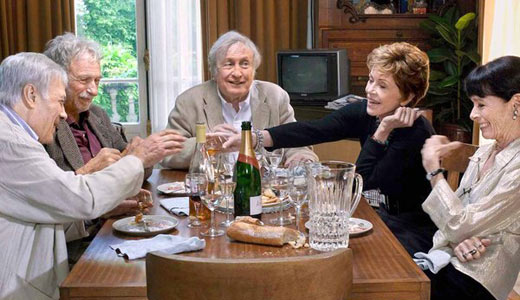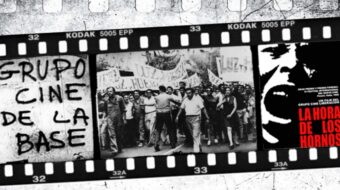
If you belong to a certain class – educated, with a nice pension or inheritance – you have a wide range of choices in life. Where and how you live will be among them. These options open the gate to all that ensues in All Together, the new French film scripted and directed by Stéphane Robelin.
The vaguely socialistic title references “The New Communards,” consisting of a crack ensemble cast of two actresses well known to American audiences. Jane Fonda plays Jeanne, a retired philosophy professor, and Geraldine Chaplin is Annie, whose family property in a leafy Parisian suburb will serve the collective. French actor Guy Bedos plays Annie’s husband Jean, while Claude Rich iss the ever-randy Claude and Pierre Richard plays Albert, Jeanne’s husband, the person most visibly affected by creeping dementia. Upcoming actor Daniel Brühl plays Dirk, a graduate student in anthropology, who finds in the newly established home a fitting subject for his thesis, and a career as the elderly group’s caretaker.
The five old friends form their house sharing arrangement as a medical and social necessity, reveling in their youthful audacity of adopting “the next hot thing.” We can easily imagine these septuagenarians directly involved in the arc of French history as it barreled along in overdrive during their formative years. Born in the 1930s, they experienced World War II and the post-war recovery, the wrenching conflicts over France’s colonial wars in Indochina and Algeria, and the near-revolutionary times that culminated in the revolt and general strikes of 1968. Jean reflects on his history of defending landless farmers. One pictures these folks in seminars and mass meetings with the likes of Picasso, Sartre, Camus, de Beauvoir.
We are introduced to Albert in a militant demonstration against the police, not coincidentally for logement – housing – conducted by a multiracial crowd in one of the not-so-chic districts of Paris. Despite a bottle he’s thrown at a policeman, Jean can’t even get himself arrested: The police simply look right through and past the old. By way of this manifestation of solidarity with their less fortunate countrymen and women, the characters of Jean and Albert establish a central and universal theme of the film: Everyone needs a place to call home.
France is regarded in the top tier of evolved “welfare states,” but still, for these activists with some intellectual playfulness and a pronounced joie de vivre still left in them, an institutional senior home, adequate for basic needs, is not an ideal nest for their last years. Needing the bonds of attachment and connection, they still cherish their libations and fine meals, good companionship, and space to exercise their flirtations and assignations. They also need to forgive one another the old affairs and jealousies of yesteryear. These wines age well.
Of course we witness some tension between collectivist and more anarchistic principles, recalling familiar divisions on the left. Yet the film bathes in life-giving symbolism: future burial plots designed to be covered in rose arbors, with benches for lunch and conversation; and at the house, a new swimming pool in the back yard, to attract the grandchildren. Young Dirk, at first curiously more inhibited than his elders, blooms in this lusty environment, profiting from his elders’ wholesome example.
In Western countries, the baby boomer demographic bulge is upon us. Last year’s Best Exotic Marigold Hotel also shows us globally groping our way toward creating a livable life in the territory where we are heading. With the cooperation of the younger generation helping us to investigate our alternatives, seniors are almost instinctively resisting the hegemonic monetization of our age, in daycare centers for profit, and assisted living communities joined at hefty monthly fees.
Secular rationalists though these oldsters all are, when they join Albert in his Lear-like yelping into the void for his lost “Jeanne! Jeanne! Jeanne!” we can only think of how a French audience will hear a frantic, tribal plea for the aid of Jeanne d’Arc, Joan of Ark, the unifying, patron saint of France, to bring us “all together.”













Comments